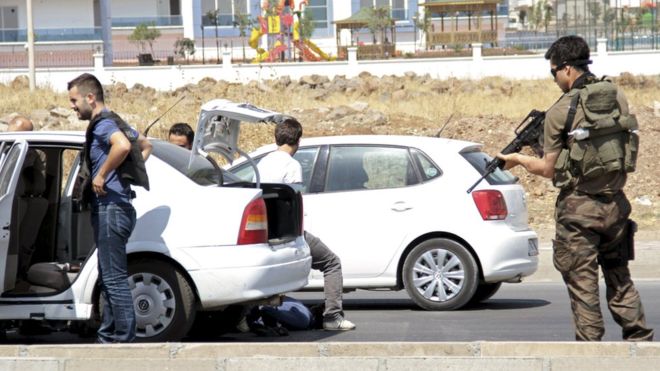Clashes occurred after police denied permission to a protest march planned by the HDP to demonstrate against the extensive security measures in the Sur district of Diyarbakir province. Two persons were shot and killed during the incidents. (Agencies)
Comment:
After the elections, the clashes between the PKK and government authorities in the East and South-East region which already began before the November 1 elections increasingly continue after the election results. Curfews and clashes prevail especially in the Silvan and Sur districts of Diyarbakir, the Cizre district of Sirnak, the Nusaybin district of Mardin and Yüksekova district of Hakkari. While ten thousands of people migrate from these regions to nearby districts, the curfew and the PKK threat prevent remaining people from meeting their basic needs. Although police provides people in partially save areas with bread, water and food, the problems in non-secure areas still continue. While operations continue for days, schools, businesses, public offices became unable to provide services.
The statements of President Erdogan regarding the Dolmabahçe Agreement following the failure of the AKP of coming alone to power in the June 7 elections, as well as the PKK’s announcement of not laying down its arms; the 2 yearlong “Resolution Process” was “put on ice”, had initiated protests in many cities. In the aftermath, the State initiated in operations within the country and in the Kandil region and this conflict continued increasingly.
Prime Minister Ahmet Davutoglu made the following statements regarding the recent operations: “All districts will be cleansed of terrorist elements, from street-to-street, house-to-house if necessary” and “I said that these mountains will be cleared when Dağlıca happened. Those mountains are cleared. There will not remain a single uncleaned street in Cizre, Silopi and Sur. Not a single House will be left” and “We will not give an opportunity to those who seek to turn Cizre into a Kobane. These comments show that the State is going to continue its security policy for another while.
Turkey is the country where the majority of Kurds live. The AKP has seen that the PKK had boosted its effectiveness both militarily and in urban regions during the “resolution process”. This situation constitutes an impediment for the AKP in gaining the Kurdish people’s support, as well as in taking steps related to Turkey. The AKP seeks to vitiate the PKK and its extensions in the region through the authorisation it received at the general elections and the public’s support. Therefore it continues the curfews and the operations.
The PKK wants to maintain its achievements from the “Resolution Process”. The “Resolution Process” had comforted the people of the region, however reduced reasons to fight the State. For the local people, winning members through the old strategy and planned actions are no longer appropriate as before. That is why the PKK changed its strategy and moved its struggle more and more away from the rural areas into the cities. The Kobani events and the people’s support, as well as experiences along the ranks of the PYD in Syria have taught the PKK urban warfare. In fact, Kobane became the headquarters for senior managers of the PKK with Behoz Erdal, Mustafa Karasu and Sofi Nurettin in the forefront.
The State seeks to hinder the PKK’s strengthening in the cities and to retrieve the PKK’s achievements of 2 years. Thus by saying, “There is no Kurd problem, there is a PKK problem”, it plans to gain the people’s support for democratic politics and to alienate it from the PKK and its extensions. Achieving this will allow effective measures against eventualities in Iraq and Syria. The State will take new political steps on behalf of a resolution after these clashes.
Moving the fights to the cities, digging ditches and tunnels in the streets is the PKK’s struggle of empowerment through the people’s support and bringing the State to heel. Even if it fails to achieve this, it still remains a move to strengthen its hand in negotiations with the State. If it is able to achieve this, it aims at getting through its demands in probable negotiations with the State, even if under a different name.
These experiences have forced the people of the region to rather choose a death of deaths. It has been forced to make a choice between being with the secular democratic State, or being together with an organisation that oppresses its people. Thus, the local Kurdish people have always been the oppressed ones.
Musa Bayoğlu

